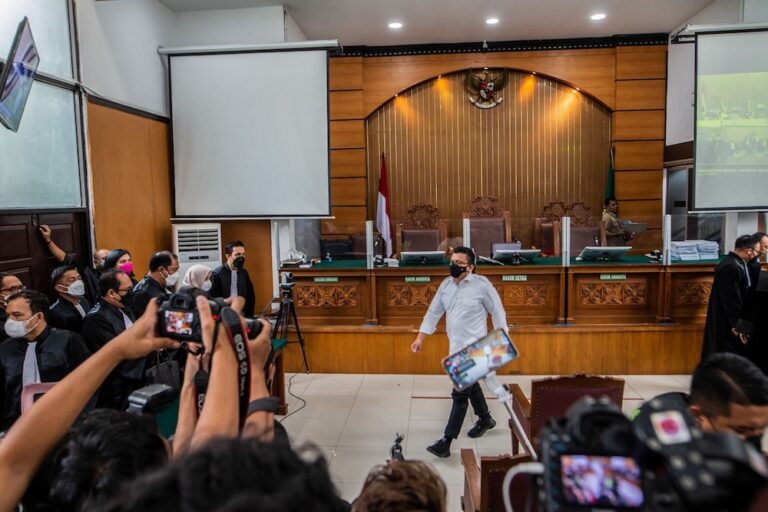(CPJ/IFEX) – CPJ is deeply concerned over reports that Indonesian authorities intend to prosecute American journalist Allan Nairn for entering the country in violation of immigration laws. Nairn’s name appears on a “blacklist” compiled by the Indonesian armed forces, barring the journalist from reporting in Indonesia. Nairn – a freelance journalist who filed regular reports […]
(CPJ/IFEX) – CPJ is deeply concerned over reports that Indonesian
authorities intend to prosecute American journalist Allan Nairn for entering
the country in violation of immigration laws. Nairn’s name appears on a
“blacklist” compiled by the Indonesian armed forces, barring the journalist
from reporting in Indonesia.
Nairn – a freelance journalist who filed regular reports from East Timor for
the American news organization “The Nation”, a weekly political magazine,
and Pacifica Radio’s current affairs program “Democracy Now!” – was detained
in Dili, East Timor, by Indonesian military officers at around 5:30 a.m.
local time on 14 September 1999. At the time of his detention, Nairn was one
of a handful of journalists still reporting in Dili after pro-Jakarta
militias backed by the Indonesian military unleashed a violent campaign to
drive pro-independence Timorese from their homes. The militias also drove
most media and other international observers out of East Timor. CPJ believes
that they targeted journalists as part of a strategy to eliminate witnesses
to the ensuing atrocities.
Nairn says he has been interrogated by police and by military officers,
including Maj. Gen. Kiki Syahnakri, head of the Indonesian military
operation in East Timor. Indonesian authorities have expelled Nairn from the
country twice since placing him on the blacklist for his coverage of the
November 1991 Santa Cruz massacre, in which Indonesian soldiers killed
scores of East Timorese demonstrators at the Santa Cruz cemetery in Dili.
On 15 September, Nairn was taken to Kupang, West Timor, on a military jet.
Nairn has since been in the custody of the immigration authorities in
Kupang. Nairn, who has been able to use his cellular phone to communicate
with colleagues abroad as well as United States government officials in
Jakarta, says that he has not been physically harmed and that he is
receiving adequate food and shelter.
CPJ has learned that top Indonesian officials – including Information
Minister Yunus Yosfiah, Justice Minister Muladi, and Minister of
Transmigration A.M. Hendro Priyono – have assured Stapleton Roy, the U.S.
ambassador to Indonesia, that they will expedite Nairn’s deportation.
Despite these assurances, on 17 September, a senior immigration official
told Nairn that Benny Mateus, the chief justice of NTT Province, intends to
prosecute him on charges of “engaging in unauthorised activities and
overstaying his two-month visa,” according to a statement released by Amy
Goodman, host of “Democracy Now!”.
CPJ is dismayed by Nairn’s prolonged detention and harassment. CPJ is
further troubled by the fact that Indonesia continues to maintain blacklists
designed to prevent certain reporters from entering the country, and is
prepared to prosecute journalists for violating visa restrictions designed
by the former Suharto government to control the flow of information.
These policies are particularly disappointing in light of President
Habibie’s administration’s recent moves to lift restrictions on the press.
On 14 May, in response to questions posed by a joint delegation from CPJ and
the Brussels-based International Press Institute, His Excellency said that
he had “no objection” to amending restrictive regulations on foreign
journalists to allow them to enter Indonesia without obtaining special
visas. Both Information Minister Yunus and Foreign Minister Ali Alatas also
indicated a willingness to change the current practices.
According to CPJ, it was a common practice under the Suharto regime to
deport foreign journalists who displeased the authorities, and to use visa
requirements to prevent some reporters from covering events in Indonesia.
The compiling of blacklists by the armed forces and the requirement that
journalists obtain special visas are restrictive, repressive relics of that
regime. As such, they are inconsistent with President Habibie’s
administration’s avowed commitment to reform.
Recommended Action
Send appeals to the president:
assure that Nairn is not prosecuted for his work in East Timor, and that he
is released immediately from the custody of the immigration authority in
Kupang
critical journalists, and that he allow all journalists to enter Indonesia
without bureaucratic restrictions
Appeals To
His Excellency Bacharuddin Jusuf Habibie
President, Republic of Indonesia
Office of the President
Bina Graha, Jalan Veteran No. 17
Jakarta Pusat, Indonesia
Fax: +62 21 778 182
Please copy appeals to the source if possible.


